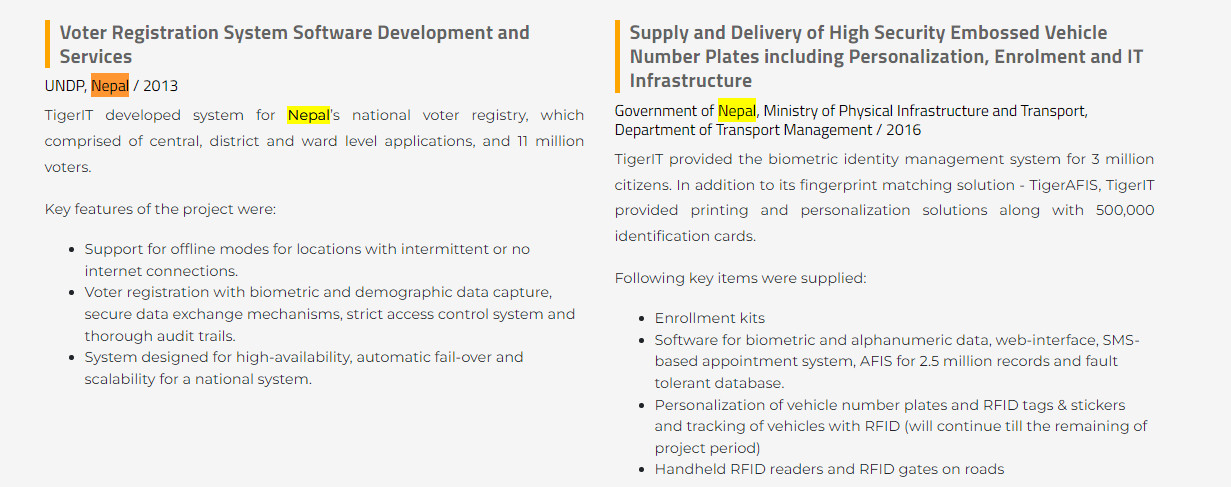Embossed plate company involved in scam

After the Department of Land Transportation (DoTM) issued a 16 July deadline for vehicle owners in Nepal to replace current license plates with embossed ones, it has emerged that the company contracted to do so was blacklisted by the World Bank.
The Nepal government repeatedly extended the $44 million contract it granted to a subsidiary of Tiger IT Bangladesh to install the computerised car plates which have camera-readable English digits, and an embedded chip that allows GPS tracking.
Nepali Times has obtained official documents that show that on 24 April 2019, Tiger IT Bangladesh and its CEO Ziaur Rahman were blacklisted by the World Bank’s Sanctions Board for ‘collusive, corrupt and disruptive’ practices on a bid for one of its projects in Bangladesh.
Read also: Nepal goes electric, but conditions apply, Ramesh Kumar

The case was heard on 5 March 5 2019 at the World Bank's headquarters in Washington DC in presence of its vice-chair where it concluded, ‘The defendants were found to have colluded in barring open competition.’
Tiger IT is said to have bribed top government officials, did not provide required details and documents to the World Bank, and ‘deliberately acted to materially impede the Bank’s investigation into the misconduct’. The company is barred from participating in any other World Bank projects for nine and a half years, and its CEO Rahman for six and a half years.
Decatur-Tiger IT, a joint venture of Tiger IT Bangladesh and US company Decatur, was first awarded the contract on 30 May 2016 to install embossed number plates on vehicles in Nepal in a deal worth $43.787 million (Rs4.68 billion).
Read also: Nepal risks being blacklisted on money laundering, Sharad Ojha

The initial agreement was to install number plates in 2.5 million vehicles in five years by mid-September of 2021. But after delays, the government renewed the contract for another two-and-half years despite knowing that the company had been sanctioned the previous year by the World Bank in its home country.
In 2014, Tiger IT had won a World Bank contract for the 'Identification System for Enhancing Access to Service Project' to establish a secure and reliable national identity system in Bangladesh. But the Bank’s investigation found that Tiger IT and its French partner had committed fraud to win the bid.
Interestingly, Tiger IT has been involved in a slew of other projects in Nepal for the past decade. In 2013 it provided voter registration system software services to the Election Commission with support from the United Nations Development Programme (UNDP). The project, however, did not go ahead for unspecified reasons, but that is not mentioned on the company’s homepage.
Read also: Nepal’s richest man in the Pandora Papers, Nepali Times

In 2010 it was involved in the conversion to machine-readable passports in Nepal in collaboration with France’s Oberthur Technologies.
Experts find it fishy that a blacklisted foreign company has such insider access to successive governments in Nepal that it wins one controversial contract after another. The passport project was also mired in allegations of kickbacks in high places.
The embossed number plate project has also been criticised because the letters and digits are in English and not Nepali when many countries in the region, including Bangladesh itself, have number plates with fonts of the country’s national language.
The DoTM deadline requires all vehicles in Gandaki and Bagmati provinces to switch to embossed plates or face a fine. There is an elaborate online process to fill the forms in English, and the process is said to be cumbersome, opening the possibility of further corruption and payoff to middlemen at DoTM offices.
Read also: Corruption deep rooted in government, Nepali Times




